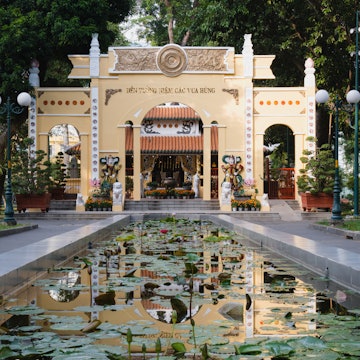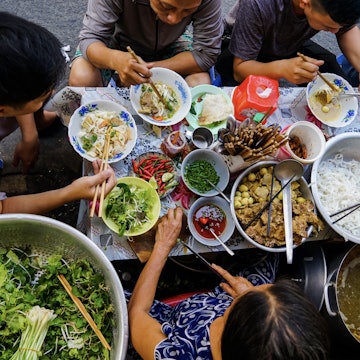

There's been a tech boom in Ho Chi Minh City © Nguyen Quang Ngoc Tonkin / Shutterstock
While Hanoi rocks, Ho Chi Minh City is rolling on a wave of tech development. Skyscrapers are shooting up and tech start-ups are appearing on every corner.
There’s even a self-styled Saigon Silicon City, under construction in District 9 in the eastern suburbs. So it's no surprise many digital nomads are looking towards Vietnam's biggest city to make a home base.
Editor's note: during COVID-19 there are restrictions on travel. Check the latest guidance before departure, and always follow local health advice.
Why should digital nomads choose Ho Chi Minh City?
For digital nomads, the city serves up delicious street food, inexpensive accommodation and easy-to-find high-speed internet connections, plus a big-city vibe that appeals to remote workers who want easy access to everything 24 hours a day. However, many co-working spaces are as popular with local freelancers as visiting nomads, and you won’t find the same sense of community as in more popular expat hubs, such as Chiang Mai or Canggu.
Those who love HCMC, love it for its energy and enthusiasm, its start-up mentality, and its design-oriented coffee shops serving full-bodied French-style coffee. On the flip side, the motorcycle traffic jams, air pollution and tropical heat can take some getting used to. When the city closes in, nomads retreat to the calmer surroundings of the Mekong Delta and such laid-back hangouts as Phu Quoc Island, with its beaches, diving and rainforest greenery.

Best co-working spaces
Easily the best-loved co-working space in Ho Chi Minh, Dreamplex has a District 1 location (in fact two of them, plus two more in Binh Thanh District), fast internet access and a no-nonsense business vibe that appeals to nomads who like to get their heads down to work. For a more social vibe, Spiced CoWorking is set in an area full of rooms for rent in District 2, and it hosts regular networking lunches and social gatherings, as well as offering its own co-living accommodations and a pool.
Internet speeds
High-speed internet is easy to find in Ho Chi Minh City, thanks to heavy investment from Singapore, and download speeds of 25 Mbps are common. Promised free city-wide wi-fi has yet to materialize, but you’ll find inexpensive local SIMs for 4G mobile coverage.
Living arrangements
Most remote workers base themselves centrally in Districts 1 and 3, while more established expats gravitate towards Districts 2 and 7. Rented apartments are the mainstay of nomad accommodations but central locations can be expensive; many transient workers prefer cheaper rooms in shared houses, though this can mean working in coffee shops and co-working spaces for relative peace and quiet. Then again, with Vietnam’s fabulous street food, you’ll want to eat out as often as possible. To get around, Uber and Grab offer a cheap alternative to local taxis, or do as locals do and jump on a motorcycle taxi.

Networking
There are several Facebook groups in HCMC aimed specifically at remote workers. Consider joining Saigon Digital Nomads and Expats in Ho Chi Minh City.
Things to do when you're not working
Get down in Chinatown – the district of Cholon, 3 miles (5km) southwest of the center, offers fabulous Chinese flavors, mercantile bustle and ornate pagodas spilling out of hidden courtyards.
Take a Delta tour – the green, rice-paddy covered wetlands of the Mekong Delta are ripe for exploration; on organized tours, or independently by rented motorcycle, bus and boat.
Weekend break on the beach at Phu Quoc – VietJet Air and Jetstar offer cheap transfers to the island airstrip, putting Phu Quoc’s beaches, beach bars and national park within easy reach.

Pros and cons of working in Ho Chi Minh
As with every travel experience in any destination, there are good bits and bad. Here's a breakdown of things to consider:
Ho Chi Minh City is great for:
★ Amazing food
★ Low cost of living
★ Plenty of culture
★ Can-do attitude
★ Coffee shops
Ho Chi Minh City is not so great for:
★ Overcrowding
★ Pollution
★ Street crime
★ Traffic
★ Sense of community
Practicalities
Climate: December to March is southern Vietnam’s dry season, but it’s super hot and everything goes into chaotic overdrive for the Tet Festival (January or February). The May-to-September rainy season brings high humidity, and starts with a blast of brutal heat.
Getting there: Tan Son Nhat International Airport, Ho Chi Minh City. Trains zip to Ho Chi Minh City from northern Vietnam while buses run to Phnom Penh in Cambodia.
Living costs: From US$900 per month.
LGBT-friendly: Yes.
Pre-departure reading
Lonely Planet’s Vietnam guidebook
The Quiet American by Graham Greene
Saigon: An Epic Novel of Vietnam by Anthony Grey
The Sympathizer: A Novel by Viet Thanh Nguyen
You might also like:
10 reasons why you should become a digital nomad in 2021
The 10 best countries for working remotely, according to Lonely Planet writers
Everything you need to consider before becoming a digital nomad
















